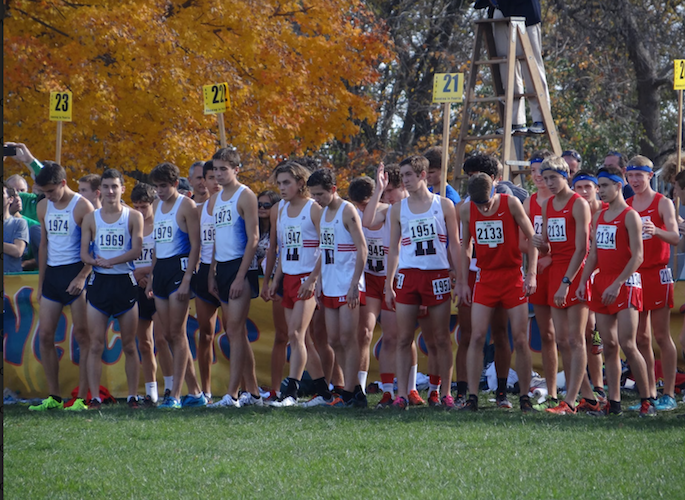Why high school sports are too intense
Ethan Planson, senior, lines up with his teammates on the IHSA Cross Country state meet starting line. As a runner I find the stress on athletes is sometimes overwhelming.
The intensity of high school sports is obvious. Student athletes practice before school with some practices beginning as early as 5 a.m. They practice after school, too, with practice for hours on end. Those hours are spent doing arduous and demanding training. This makes sense, though, because in a state and conference that is so athletically talented, the only way to be on par with competition is to put in that necessary work. The only way to win state is to put hours and hours of training. But is it all worth it? I think not.
As a cross country runner, I’m familiar with a high intensity sport. Us runners go off every day to run up to ten miles. Not only are practices a lot, but so is the sport as a whole. We are expected to live the life of a runner every day which means sleep well, eat well, find time to do auxiliary exercises, and be cautious with things you do to minimize the risk of injury.
“It just takes a lot of dedication,” said Ethan Planson, senior. “You have to be willing to run 60 miles a week and sacrifice a lot of things to be a better runner. It’s a lot.”
This dedication is one that can take away from others aspects of life. To illustrate, the life of a high school athlete goes wake up, eat breakfast, go to school, go to practice, come home around 6, eat dinner, do homework and repeat. Little to no time is left for other hobbies and interests. And considering high school is one of the only times of our lives to explore our interests and find our passions, this a problem.
Having a busy high school life has also been shown to lead to stress. In the United States, the average teen has rated their stress levels at 5.8 out of ten. This is far above what’s considered to be a healthy level of stress: a 3.9. Being a part of a demanding sport only raises this level of stress because of the fact that it creates a busier schedule. For many, it’s difficult to juggle everything that high school has in store.
“School, homework, extracurricular activities, sleep, repeat- that’s what it can be for some of these students,” said Noelle Leonard, PhD, a research scientist at NYU in her study on stress.
In our present society, the intensity of sports start when we’re young. The notion of win at all costs is one that has been shoved down our throats without us even realizing it. Coaches yell at twelve year olds to throw better passes. Dads yell at refs for making wrong calls. And practices are run every day, for hours, for twelve year olds. Youth sports are made to be as important as high school sports so that by the time they’re in high school, many quit. And now, high school sports are made out to be as important as professional sports.
Ultimately, a sport is just a sport. Although losing may seem like the end of the world and winning feels like you’re on top of the world, it’s practically meaningless. What must be done is a shift to getting what’s valuable out of sport. That’s teamwork, friendship, and fun. It’s what we’ll remember in the long run, not the stress and exhaustion that comes with a win at all costs attitude.

If you can't find Jacob at the skatepark, or at the Hinsdale central track, then good luck finding him, because as a lover of nature he's probably in the...














